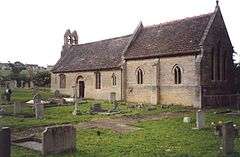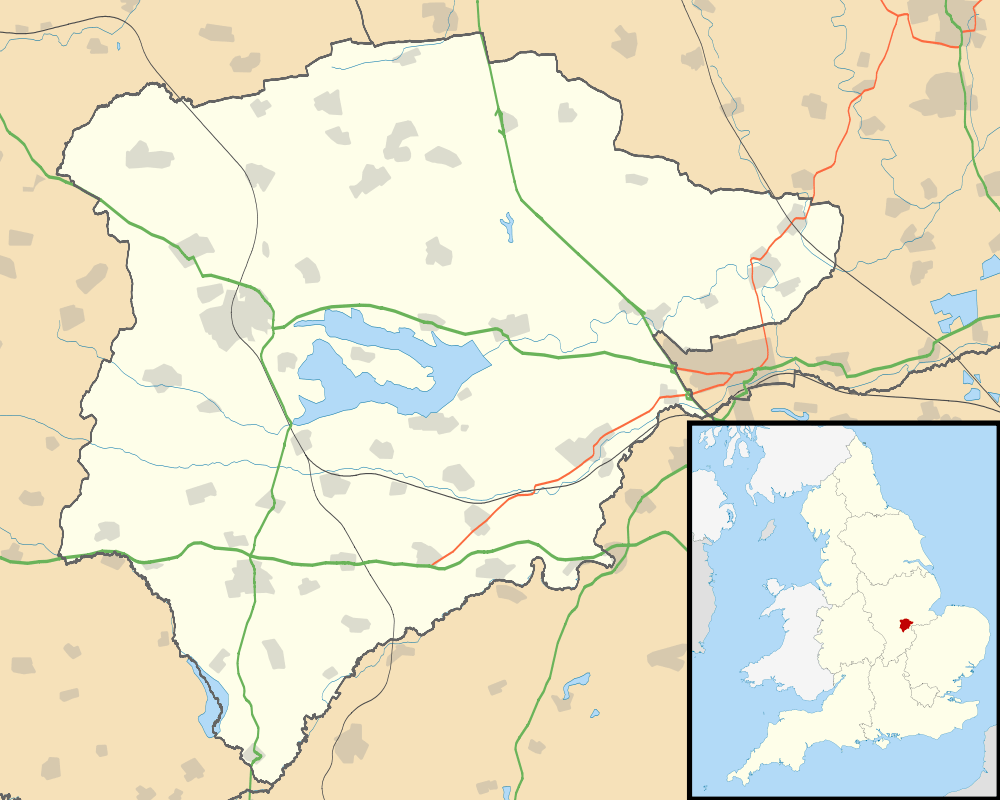Essendine
Essendine is a village and civil parish at the eastern end of the county of Rutland in the East Midlands of England. The population of the civil parish at the 2011 census was 448.[3] It lies on the West Glen, close by the earthworks of a small castle.
| Essendine | |
|---|---|
 Essendine Church | |
.jpg) Former goods yard from a northbound train | |
 Essendine Location within Rutland | |
| Area | 2.31 sq mi (6.0 km2) [1] |
| Population | 448 (2011 Census)[2] |
| • Density | 159/sq mi (61/km2) |
| OS grid reference | TF043124 |
| • London | 84 miles (135 km) SSE |
| Unitary authority | |
| Ceremonial county | |
| Region | |
| Country | England |
| Sovereign state | United Kingdom |
| Post town | STAMFORD |
| Postcode district | PE9 |
| Dialling code | 01780 |
| Police | Leicestershire |
| Fire | Leicestershire |
| Ambulance | East Midlands |
| UK Parliament | |
Geology
Most of the village is on Blisworth Limestone or Upper Estuarine Series geology, though the church and castle are on river alluvium. In the parish generally, the soils are shallow and well drained with limestone brash. There is some clay which is naturally rather poorly drained and occasionally waterlogged. It produces the wheat, barley, sugar beet and some potatoes usual in eastern England
Buildings
The small church has a notable Norman tympanum over its south door.[4][5] It is built within the remains of the Castle, which appears to have been a very early Norman bailey later developing into a strongly fortified manor.[4][6][7]
The village is dominated by a large industrial site, once the factory of Allis Chalmers, later Fiat-Allis. After closure various buildings were rented to a variety of small enterprises, and there are a large number of small businesses to be found to this day.
Controversially two substantial fires occurred there in a short time.[8]
The railway
Essendine railway station was on the East Coast Main Line. The railway line and station opened in 1852 and the station closed in 1966.[9] The line is still very busy.
The station also became the main line terminus of the short Stamford to Essendine line (via Belmesthorpe) which opened in 1856.[10] The Bourn and Essendine Railway (old spelling) opened on 16 May 1860.[11]
On 3 July 1938, north of Essendine and just over the border in Lincolnshire at Milepost 90¼, LNER Class A4 locomotive number 4468 Mallard set the land speed record for a steam locomotive, reaching 126 mph, unbeaten to this day. A commemorative sign was erected by the track near the milepost in 1998.
References
- "A vision of Britain through time". University of Portsmouth. Retrieved 11 February 2009.
- "Civil Parish population 2011". Neighbourhood Statistics. Office for National Statistics. Retrieved 24 June 2016.
- "Civil Parish population 2011". Neighbourhood Statistics. Office for National Statistics. Retrieved 24 June 2016.
- A History of the County of Rutland. Victoria County History. 2. 1935. pp. XXVII–XLIV.
- "National Monument record:Church".
- Creighton, Oliver (1999). "Early Castles in the Medieval Landscape of Rutland" (PDF). Transactions of the Leicestershire archaeological and Historical society. 73.
- "National Monument record:castle".
- "Newspaper account of reaction to fires".
- "National Monument Record:Railway station".
- "National Monument record:Stamford and Essendine railway".
- "National Monument Record:Bourne and Essendine railway".
- Anon. British Geological Survey, 1:50 000, Sheet 157, Solid and Drift edn. (1976).
- Anon. Soils England and Wales Scale 1:250 000. Sheet 4. (1983).
- Rhodes, J. Bourne to Essendine (1986) ISBN 0-948017-03-1.
External links
| Wikimedia Commons has media related to Essendine. |
- A photograph of the church. The castle earthworks are among the trees.
- Essendine Open directory listing for this village.
- Page, William, ed. (1935). "'Parishes: Essendine'". A History of the County of Rutland. Victoria County History. 2. pp. 250–254. Extensive early history of the village.